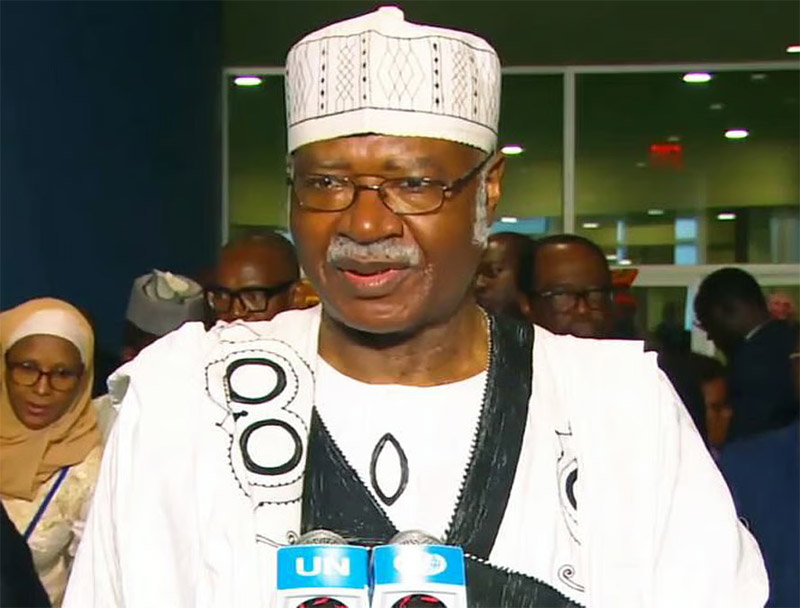UNITED NATIONS, Feb 2: India has undergone a “remarkable transformation” over the past decade, according to UN General Assembly President Philemon Yang. He emphasized that his forthcoming visit to India would provide him with an opportunity to witness firsthand how digital and technological innovations have driven this change.
Yang’s visit to India is scheduled from February 4 to 8, marking his first official trip to the country as President of the 79th session of the UN General Assembly.
When asked about the focus of his visit, Yang expressed his eagerness to “gain a deeper understanding of India’s priorities and vision for the future of multilateralism.”
During his stay, he will engage with Indian leadership, including President Droupadi Murmu and External Affairs Minister Dr. S. Jaishankar.
Reflecting on his previous visit to India in 2013 as Prime Minister of Cameroon, Yang noted the substantial transformation India has experienced since then. He anticipates that his visit will allow him to observe how digital and technological innovations have positively impacted communities at the grassroots level.
“This visit will also emphasize the importance of information sharing and capacity-building in promoting sustainable development in the Global South. India’s role in South-South cooperation has been particularly commendable,” Yang remarked in a written interview.
Yang’s message to the people of India, especially the youth, is one of hope and aspiration. He encourages them to remain confident in their achievements while striving for further progress to make the world a better place.
“I urge them to continue leading innovation initiatives while also celebrating their rich cultural heritage,” he added.
“As the world’s most populous nation, India has a crucial stake in the UN’s work, in achieving the Sustainable Development Goals, and ensuring that no one is left behind. I eagerly anticipate witnessing India’s ongoing engagement and leadership within the UN,” Yang stated.
Yang commenced his year-long term as President of the 193-member General Assembly in September during the opening of the 79th UNGA session.
His priorities as President include enhancing peace and security in Africa, combating the illicit use of small arms and light weapons, eliminating child labor, and accelerating progress towards the SDGs through digitalization.
With a keen interest in how digitalization can support the SDGs, Yang expressed his desire to explore how India is leveraging digital technology to improve citizens’ lives, particularly in healthcare.
As part of this endeavor, Yang plans to visit a District Vaccine Store in Gautam Buddha Nagar, Uttar Pradesh, and meet with healthcare workers to analyze the impact of digital public infrastructure tools.
“I’ve been informed that the Co-WIN platform played a pivotal role in administering two billion doses during the COVID-19 pandemic, often referred to as the ‘digital backbone’ of the vaccination campaign,” he noted.
Yang also intends to visit the Infosys Campus, the Indian Institute of Science in Bengaluru, as well as additional sites in Delhi and Bengaluru.
When asked to identify three areas where India significantly contributes to the multilateral system, Yang highlighted India’s peacekeeping contributions, its role as a first responder in various humanitarian crises, and its strong advocacy for the Global South.
He emphasized that India’s most notable contribution to the UN lies in its peacekeeping operations, both through financial backing and personnel commitment.
India has deployed over 290,000 peacekeepers across 49 of the 71 UN peacekeeping missions initiated since 1948, marking a significant commitment to global peace and security.
Additionally, he pointed out that India has consistently acted as a first responder in humanitarian emergencies in its region, providing essential aid in the form of food and medical supplies to areas ravaged by conflict and disaster.
“Moreover, India’s unwavering efforts to represent and advance the interests of the Global South, particularly in mobilizing financing for sustainable development and advocating for climate financing for developing nations, have demonstrated timeliness and sincerity,” Yang explained.
“I hope that India continues to champion the Global South’s interests,” he added.
India has rapidly positioned itself as a vital facilitator of South-South cooperation through initiatives like the India-UN Development Partnership Fund, which promotes sustainable development projects in Least Developed Countries (LDCs), Landlocked Developing Countries (LLDCs), and Small Island Developing States (SIDS).
“For all these reasons, I express my sincere appreciation for India’s long-standing commitment to multilateralism, and I trust that this dedication will persist,” Yang concluded.
As UNGA President, Yang oversaw the adoption of the Pact for the Future last September.
Regarding the Pact and its roadmap, Yang noted his role includes supporting implementation efforts. “I aim to achieve this by fostering inclusive dialogue, creating avenues for Member States to engage meaningfully in the Pact’s implementation, and galvanizing collaborative efforts to meet its goals.”
When asked how he envisions India’s role in this context, Yang emphasized that India is a prominent voice for the Global South and has made remarkable advancements at the national level, particularly in fields like artificial intelligence, which aligns with the Pact’s focal areas.
“Therefore, I believe India, along with other Global South countries, should not only participate actively in these discussions but also lead the national execution of the Pact’s commitments,” he stated. (PTI)


Leave a Reply